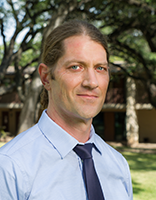By Dr. Anthony Baker
Once upon a time there was a white male professor who cared deeply about racial justice, who wanted very much to help form a campus community that was rich with diverse experiences and questions. And who didn’t know how to begin.
Six years ago I knew I had habits that, like inertia, carried white-centered existence into the classroom and beyond it. Some of those habits I could name, some I couldn’t. I was beginning to suspect I was part of the problem. I simply didn’t know how to be part of the solution.
Then the administration brought the idea of a partnership with the BRSG to us, and I’ve never been more grateful for good leadership. A five-year trust-building relationship between our campus and the guild of scholars who has more collected wisdom about race and religion in America than anyone? I’m in.
That first seminar we had with Dr. Willie Jennings, Dr. Stacy Floyd-Thomas, and Dr. Juan Floyd Thomas opened my eyes to a pathway into and through the world of theological study that was new and foreign to me. You helped me see how my colleagues and students of color experienced the world of theological education. And it was so different than the guild that had formed me. I still find myself ruminating on things I learned during that visit.
My education continued the following year, when Rev. Dr. Melanie Jones and I taught a class on liberation theologies together. As we got to know one another and found the rhythm of that class, I began to notice things about the way that I carried myself on campus that was a result of unexamined privilege. “Privilege” is a loaded word, and Dr. Meeks once reminded us that it’s not actually a privilege to live with unexamined habits. But it still feels to me like the right word. I had made a career of being a cool professor. Students called me by my first name, I dressed straight out of the dryer. Sometimes I even held class at the Posse East.
I watched Rev. Melanie carry herself with such poise and professionalism. She dressed fabulously every time we taught together. I began looking down at my wrinkled linen and feeling a little self-conscious. One day in class the light just came on: “I’m a tall straight white man, and this space was created for people like me.” No one questioned my right to be up there teaching a class—at least no one since those first semesters, when I was fresh meat for hungry seminarians. And here was Rev. Melanie, earning every ounce of respect the students and the academy gave her.
Rev. Melanie also led us in some difficult (for you no less than us) conversations, processing and even confessing our own biographies around racial awareness. You helped me begin to see what internal work I needed to do, if I was going to be the generous and just and curious colleague and professor that I deeply wanted to be.
When I heard that our next visiting professor would be Dr. Cheryl Kirk-Duggan, I have to admit that I had an immediate question in my mind: were we the right sized container for a presence like her? I hadn’t even met her yet, but knew her by her writing and reputation. Looking back, that was exactly the right question. I’m still not sure I know the answer. But came she did, and she even danced at my wedding. That’s something I’ll never forget.
Dr. Norton was with us through the trauma year, giving us all she could via Zoom calls, trying to get to know us and help us see where some of our blind spots were. Among the worst crimes of the pandemic is that we never got to experience the Beyoncé Mass.
And then came Rev. Dr. Brandon Crowley. Dr. Crowley would walk into the faculty lounge at lunch time each day shouting “Hello saints!” And carrying—always—his beloved Chick-Fil-A.
That post-covid year stands out in my mind as the point where something shifted down in McDonald Hall. Something very strange was happening at our predominately white institution. That year I began to overhear my black colleagues speaking to one another—and sometimes even to me—without code-switching for their white colleagues. We hosted gospel choirs and black preachers. The one-two punch of Dr. Crowley and Dr. Robinson in the pulpit of Christ Chapel and in the classroom opened up a whole new world of church life to us. I found myself getting back in touch with my own deep roots in the holiness traditions. Those colleagues helped me see that past as something I didn’t need to turn from entirely, but could integrate into my Episcopalian identity.
And then the remarkable gift that is Dr Ray. I could sit and listen to Dr. Ray talk about theological education all day and not get bored. I have to filter his words, in fact, because every other sentence has the potential to change my life entirely if I sit and contemplate it too long.
What a remarkable thing, to offer 5 years of consistent courses in Black Theology, Womanism, and Black Church Studies here at Seminary of the Southwest. I know that the first iteration of our partnership with the BRSG is coming to an end. But I sincerely hope it’s the beginning of 2.0. It feels to me like we’re on the brink of being a different kind of seminary.
So I want to say a public thank you to these guest professors. You all have started me on a long journey, and I am so grateful to have had you walking part of the way with me.
I am committed to staying on that journey: to continue forming the kinds of relationships of trust across racial difference that will inform my life and scholarship. To accompany other white students and colleagues on their own journeys. To carry on with this hard work of confession, connection, and commitment (Dr. Kirk-Duggan will appreciate that alliteration). I know my colleagues are as well, and am so thankful for the work that we are all doing to keep these conversations alive. It’s hard work we’re doing here. And I believe it’s how God wants to answer our prayer, thy kingdom come on earth as it is in heaven.
To the broader Seminary community, I’ll end with two questions. I can’t do this hard work alone, and neither can you: what are the resources you need, and who are the leaders and companions you need, to help you make space for racial difference in your community? And for some of you: what and who do you need in order to help your community make space for you?
This fall, Sowing Holy Questions reflects on the personal and professional impacts of the Black Religious Scholars Group Visiting Professor partnership of the past five years.



